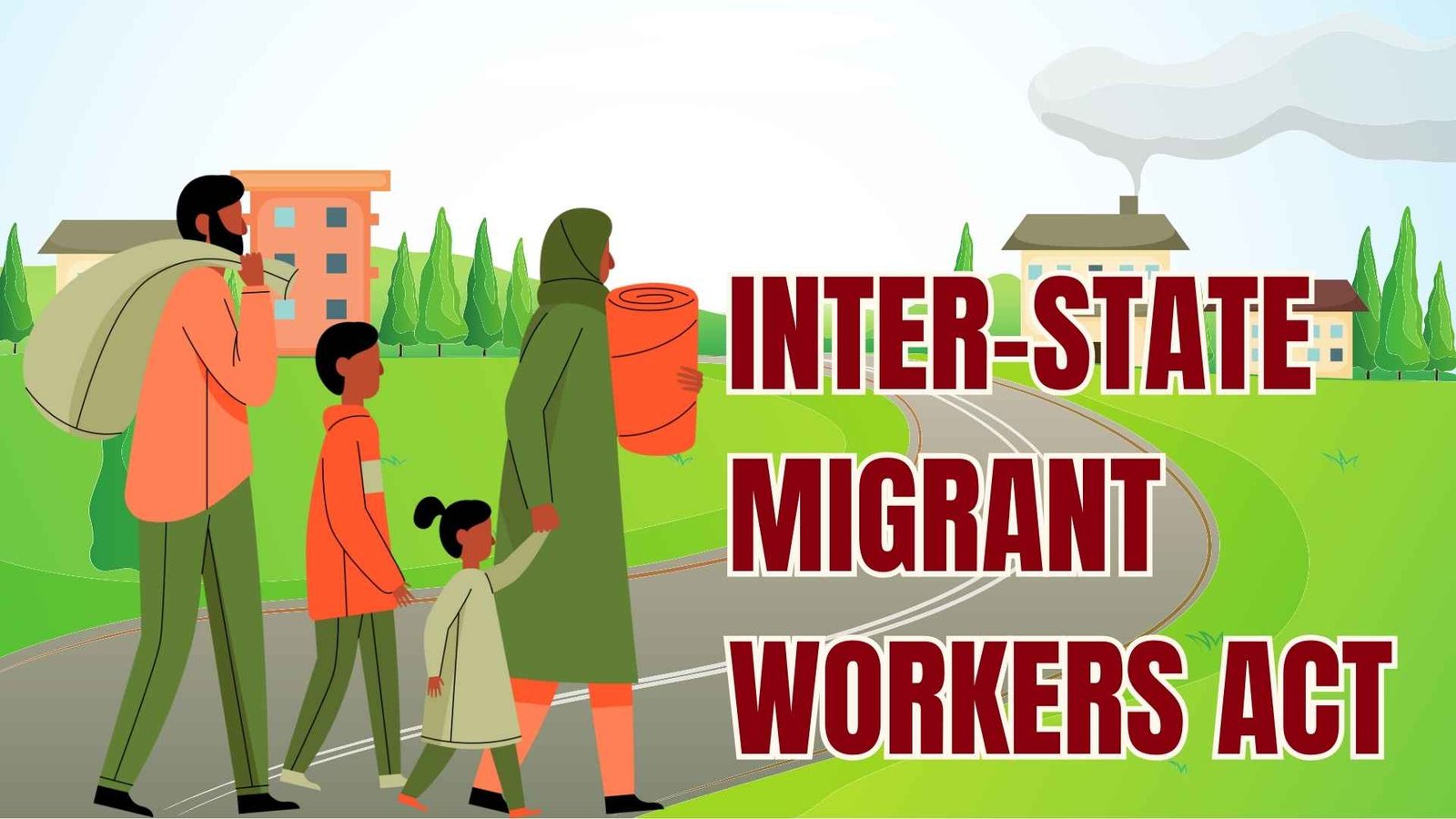On this page you will read detailed information about Inter-State Migrant Workers Act.
As an employer or business owner in the United States, you may find yourself navigating the complex landscape of interstate migrant worker regulations. The Inter-State Migrant Workers Act plays a crucial role in protecting the rights of workers who cross state lines for employment opportunities. Understanding this legislation is essential for ensuring compliance and fostering a fair work environment. In this article, you will gain insights into the key provisions of the Act, its implications for both employers and workers, and the responsibilities it entails. By familiarizing yourself with these regulations, you can better manage your workforce and mitigate potential legal risks.
What is the Inter-State Migrant Workers Act?
The Inter-State Migrant Workers Act, formally known as the Inter-State Migrant Workmen (Regulation of Employment and Conditions of Service) Act, is a landmark piece of legislation enacted by the Indian government in 1979. This Act was introduced to address the exploitation and poor working conditions of migrant laborers who were recruited from one state to work in establishments in another state.
Purpose and Scope
The primary aim of the Inter-State Migrant Workers Act is to regulate the employment of inter-state migrant workers and provide for their conditions of service. It applies to establishments and contractors that employ at least five inter-state migrant workers. The Act was a response to the exploitative system of “dadan labor,” where migrant workers often faced broken promises, long work hours, and poor living conditions.
Key Provisions
Under the Act, migrant workers are entitled to several rights and benefits:
- Equal wages compared to local workers
- Displacement allowance
- Journey allowance
- Suitable accommodation and medical facilities
- Mandatory issuance of a pass-book with employment details
The Act also requires contractors and principal employers to maintain registers, issue pass-books, and report accidents. State governments are tasked with appointing inspectors, registration officers, and licensing officers to enforce the Act’s provisions.
Implementation Challenges
Despite its noble intentions, the Inter-State Migrant Workers Act remains largely unimplemented, as evidenced during the COVID-19 reverse migration. Many inter-state migrants continue to face challenges such as meager wages, adverse employment conditions, and lack of social protection. The Act’s limitations became particularly apparent during the pandemic, highlighting the urgent need for a comprehensive inter-state migration protection and welfare policy.
Key Provisions of the Inter-State Migrant Workers Act
The Inter-State Migrant Workers Act, enacted in 1979, aims to safeguard the rights and well-being of workers who cross state lines for employment. This legislation establishes crucial protections and responsibilities for both employers and migrant laborers.
Registration and Licensing Requirements
Under the Inter-State Migrant Workers Act, establishments employing five or more inter-state migrant workers must register with the appropriate authorities. Similarly, contractors recruiting such workers are required to obtain licenses. These measures ensure proper documentation and oversight of migrant labor practices.
Worker Protections and Benefits
The Act mandates several key benefits for inter-state migrant workers:
- Issuance of a passbook containing employment details
- Payment of displacement and journey allowances
- Provision of suitable housing and medical facilities
- Equal pay for equal work, regardless of gender
According to the Act, workers are entitled to wages at least equal to those of local workers or the minimum wage, whichever is higher. This provision helps prevent exploitation and ensures fair compensation.
Employer Responsibilities
Employers and contractors have several obligations under the Act, including:
- Maintaining accurate worker registers
- Reporting accidents or injuries promptly
- Ensuring regular wage payments
- Providing protective clothing and equipment
The legislation also establishes grievance redressal mechanisms to address worker complaints and disputes effectively.
Enforcement and Penalties
To ensure compliance, the Act provides for the appointment of inspectors and prescribes penalties for violations. State governments are responsible for appointing registration and licensing officers, as well as handling appeals related to the Act’s implementation.
While the Inter-State Migrant Workers Act offers significant protections, its effectiveness has been challenged by implementation issues. Ongoing efforts aim to strengthen enforcement and adapt the legislation to evolving labor market dynamics.
Registration of Establishments Employing Migrant Workers
Under the Inter-State Migrant Workers Act, establishments that employ migrant workers are required to register with the appropriate authorities. This crucial step ensures the protection of workers’ rights and helps maintain proper oversight of labor practices.
Registration Process
To comply with the Inter-State Migrant Workers Act, employers must follow a specific registration process. This typically involves submitting an application to the designated government office, providing details about the establishment and the number of migrant workers employed. The registration helps create a record of establishments employing inter-state migrant workers, allowing for better monitoring and enforcement of labor laws.
Documentation Requirements
When registering, establishments must provide various documents to support their application. These may include:
- Proof of business registration
- Details of the establishment’s location and operations
- Information about the migrant workers, including their home states
- Proposed terms of employment and working conditions
Ensuring all required documentation is in order can help streamline the registration process and avoid delays.
Benefits of Registration
Registering your establishment under the Inter-State Migrant Workers Act offers several advantages:
- Legal compliance: It ensures your business operates within the framework of labor laws.
- Worker protection: Registration helps safeguard the rights and welfare of migrant workers.
- Improved oversight: It allows authorities to better monitor working conditions and address any issues that may arise.
By adhering to the registration requirements, employers contribute to a more transparent and fair work environment for inter-state migrant workers.
In the previous post, we had shared information about Creation of Trust under the Indian Trust Act 1882, so read that post also.
Licensing of Contractors and Recruiting Agents
Requirements for Obtaining a License
Under the Inter-State Migrant Workmen Act, contractors who recruit or employ five or more inter-state migrant workers are required to obtain a license from the appropriate licensing officer. This crucial step ensures that the recruitment process is conducted legally and transparently, safeguarding the interests of both migrant workers and hiring contractors.
To obtain a license, contractors must submit detailed information about the migrant workers they intend to employ, including names, addresses, ages, and places of work. Additionally, they must provide an undertaking for the health and safety of these workers. The licensing fees vary based on the number of migrant workers, ranging from ₹200 for 5-20 workers to ₹10,000 for over 2,000 workers.
Responsibilities and Compliance
Licensed contractors have several key responsibilities under the Inter-State Migrant Workers Act. They must issue a passbook to every migrant worker containing essential details of employment, wages, allowances, and other benefits. Furthermore, contractors are obligated to ensure timely payment of wages and provide additional benefits such as displacement allowance, journey allowance, and adequate facilities like medical care and protective clothing.
It’s important to note that licenses are valid for one calendar year and can be renewed. However, failure to comply with license conditions or contravention of the Act’s provisions may result in revocation of the license or forfeiture of the security deposit.
Enforcement and Appeals
To ensure compliance, inspectors can be appointed to monitor adherence to the Act’s provisions. Penalties are prescribed for those who violate these regulations. In cases where contractors or principal employers are aggrieved by decisions related to registration or licensing, they have the right to appeal to an appellate officer nominated by the appropriate government within 30 days.
Journey Allowance and Displacement Allowance
The Inter-State Migrant Workers Act provides crucial financial support to workers who relocate across state lines for employment. Two key benefits outlined in the Act are the Journey Allowance and Displacement Allowance.
Journey Allowance
The Journey Allowance is designed to cover travel expenses for inter-state migrant workers. According to the Act, contractors must pay workers a journey allowance that is “not less than the fare from their place of residence in the home state to the place of work in the other state, for both the outward and return journeys.” This allowance ensures that workers can afford to travel to their new workplace and eventually return home.
Importantly, workers are also entitled to wages during these journeys, as if they were on duty. This provision helps offset the income lost during travel time.
Displacement Allowance
The Displacement Allowance compensates workers for the inconvenience and expenses associated with relocating. The Act mandates that every inter-state migrant worker receive a displacement allowance equal to 50% of their monthly wages or Rs. 75, whichever is higher. This allowance is paid at the time of recruitment and is non-refundable.
Implementation Challenges
While these allowances are legally required, implementation often falls short. Some contractors attempt to bypass the Act by not registering themselves or by listing workers’ local addresses instead of their permanent home state addresses. These practices can deprive workers of their rightful benefits.
To address these issues, the upcoming Occupational Safety, Health and Working Conditions Code 2020 aims to improve compliance through measures like worker registration on a portal based on self-declaration and Aadhaar. These steps could help ensure that inter-state migrant workers receive the Journey and Displacement Allowances they are entitled to under the law.
Payment of Wages
The Inter-State Migrant Workers Act establishes crucial guidelines for the timely and fair payment of wages to migrant workers. These provisions are designed to protect the financial interests of workers who have traveled across state lines for employment.
Wage Payment Schedule
Under the Inter-State Migrant Workers Act, contractors are required to pay wages before the expiry of the 7th day for establishments with less than 1000 workers, or the 10th day for larger establishments, of every month. This ensures that workers receive their compensation in a timely manner, preventing financial hardship due to delayed payments.
Mode and Manner of Payment
The Act stipulates that wages must be paid directly to the worker or their authorized representative, primarily in cash. Importantly, no unauthorized deductions are permitted, safeguarding workers from potential exploitation. To maintain transparency, wage disbursement must occur in the presence of an authorized representative of the principal employer.
Additional Allowances
Inter-state migrant workers are entitled to several additional financial benefits:
- A displacement allowance equivalent to 50% of monthly wages or Rs. 75, whichever is higher
- Outward and return journey allowances
- Wages for the journey period
These provisions help offset the costs associated with relocation and travel, recognizing the unique challenges faced by migrant workers.
Employer Responsibilities
Contractors must maintain detailed records, including muster rolls, wage registers, and deduction registers. They are also required to display notices showing wage periods, time and place of disbursement, and inspector information. If a contractor fails to make timely payments, the principal employer becomes liable for the full amount or unpaid balance, ensuring workers are not left without their due wages.
By establishing these comprehensive wage payment provisions, the Inter-State Migrant Workers Act aims to create a fair and transparent system that protects the rights and financial well-being of migrant workers in India.
Proper Housing Facilities for Migrant Workers
The Inter-State Migrant Workers Act recognizes the importance of providing adequate housing for workers who travel across state lines for employment. This crucial aspect of the legislation aims to ensure the well-being and dignity of migrant laborers during their stay in host states.
Minimum Standards for Accommodation
Under the Inter-State Migrant Workers Act, employers are required to provide housing that meets specific criteria. These standards include:
- Adequate space per worker
- Proper ventilation and lighting
- Clean and hygienic sanitation facilities
- Access to safe drinking water
Employers must ensure that the accommodations are structurally sound and offer protection from the elements, maintaining a safe and comfortable environment for workers.
Separate Facilities for Families
The Act recognizes the unique needs of migrant workers who travel with their families. It mandates the provision of separate living quarters for families, ensuring privacy and maintaining family unity. This consideration helps reduce the stress of relocation and supports the overall well-being of migrant workers and their dependents.
Regular Inspections and Maintenance
To uphold the quality of housing facilities, the Inter-State Migrant Workers Act calls for regular inspections and maintenance of the provided accommodations. These measures help identify and address any issues promptly, ensuring that the living conditions remain suitable throughout the workers’ stay.
By implementing these housing provisions, the Inter-State Migrant Workers Act aims to create a more humane and supportive environment for those who contribute significantly to the economic growth of different regions within the country.
Resolving Disputes Under the Act
The Inter-State Migrant Workers Act provides mechanisms for addressing grievances and resolving disputes that may arise between migrant workers and their employers. Understanding these processes is crucial for both workers and employers to ensure fair treatment and compliance with the law.
Grievance Redressal Mechanisms
The Occupational Safety, Health, and Working Conditions Code, 2020 (OSH Code) mandates the establishment of grievance redressal mechanisms to address complaints and disputes related to inter-state migrant workers. These mechanisms are designed to be accessible and effective in resolving issues such as wage disputes, working conditions, and other concerns. Employers are required to set up these systems to ensure that migrant workers have access to justice and fair treatment.
Legal Recourse and Enforcement
In cases where grievances cannot be resolved internally, the Inter-State Migrant Workers Act provides for legal recourse. The Act authorizes the assessment of civil money penalties of up to $1,000 per violation, considering factors such as compliance history and the gravity of the violation. Workers who feel their rights have been violated can file complaints with the appropriate authorities or seek judicial review in district courts.
Challenges in Implementation
Despite the provisions for dispute resolution, migrant workers often face significant barriers in accessing these mechanisms. These challenges include lack of formal documentation, discrimination, and employers’ ability to evade liability through complex contracting arrangements. To address these issues, there is a growing call for strengthening labor regulatory institutions, integrating anti-discrimination laws, and ensuring principal employer liability across supply chains.
By understanding and utilizing the dispute resolution mechanisms provided under the Inter-State Migrant Workers Act, both workers and employers can contribute to a fairer and more equitable work environment for inter-state migrant workers.
Inter-State Migrant Workers Act FAQs
The Inter-State Migrant Workers Act is a crucial piece of legislation designed to regulate the employment of inter-state migrant workers and safeguard their rights. It applies to establishments and contractors employing five or more inter-state migrant workers, ensuring fair treatment and improved working conditions for this vulnerable workforce.
The Act mandates several important measures to protect migrant workers:
i) Issuance of a pass-book to every inter-state migrant worker, containing essential details
ii) Payment of a displacement allowance, equivalent to 50% of monthly wages or Rs. 75, whichever is higher
iii) Provision of journey allowance, including wages during travel
iv) Suitable residential accommodation, medical facilities, and protective clothing
v) Equal pay for equal work, regardless of gender
The primary responsibility for enforcing the Inter-State Migrant Workers Act lies with both the Central and State Governments or Union Territories, depending on the jurisdiction of the establishment. This shared responsibility ensures comprehensive coverage and implementation of the Act’s provisions across the country.
By regulating employment conditions and mandating specific benefits, the Act significantly improves the lives of inter-state migrant workers. It addresses key issues such as displacement, fair wages, and access to basic amenities, helping to create a more equitable work environment for this often-overlooked segment of the workforce.
Conclusion
As you’ve seen, the Inter-State Migrant Workers Act plays a crucial role in protecting the rights and welfare of migrant laborers in India. By understanding its key provisions and implementation, you can better appreciate the challenges faced by these workers and the legal safeguards in place. Moving forward, it’s essential to remain informed about any amendments or updates to this legislation. As a responsible citizen, you have the power to advocate for stronger enforcement and raise awareness about migrant workers’ rights. By supporting initiatives that align with the Act’s objectives, you can contribute to creating a more equitable and just environment for inter-state migrant workers across the country.
Disclaimer
The information and services on this website are not intended to and shall not be used as legal advice. You should consult a Legal Professional for any legal or solicited advice. While we have good faith and our own independent research to every information listed on the website and do our best to ensure that the data provided is accurate. However, we do not guarantee the information provided is accurate and make no representation or warranty of any kind, express or implied, regarding the accuracy, adequacy, validity, reliability, availability, or completeness of any information on the Site. UNDER NO CIRCUMSTANCES SHALL WE HAVE ANY LIABILITY TO YOU FOR ANY LOSS OR DAMAGE OF ANY KIND INCURRED AS A RESULT OR RELIANCE ON ANY INFORMATION PROVIDED ON THE SITE. YOUR USE OF THE SITE AND YOUR RELIANCE ON ANY INFORMATION ON THE SITE IS SOLELY AT YOUR OWN RISK. Comments on this website are the sole responsibility of their writers so the accuracy, completeness, veracity, honesty, factuality and politeness of comments are not guaranteed.
So friends, today we talked about Inter-State Migrant Workers Act, hope you liked our post.
If you liked the information about Inter-State Migrant Workers Act, then definitely share this article with your friends.
Knowing about laws can make you feel super smart ! If you find value in the content you may consider joining our not for profit Legal Community ! You can ask unlimited questions on WhatsApp and get answers. You can DM or send your name & number to 8208309918 on WhatsApp






